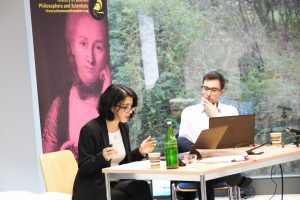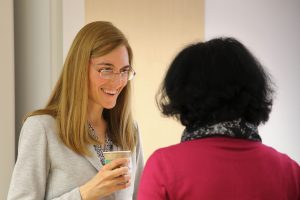
f.l.t.r. Prof. Dr. Ronny Miron and Dr. Rodney Parker (Photo by Melis Yilmaz)
The event brought researchers and students together to explore new ways of understanding the phenomenological aspects of more well known women, such as Hannah Arendt, Edith Stein, and Hedwig Conrad-Martius, and to discuss the life and work of less well known women in the phenomenological movement, such as Else Voigtländer, Erika Gothe, and Margarete Ortmann.
The conference began with a short welcome by the Center’s lead researcher on Women in Early Phenomenology, Dr. Rodney Parker, which included a brief overview of the history and mission of the Center, and an introduction to the challenges faced when doing historical research on women in phenomenology.
The first invited speaker was Prof. Dr. Ronny Miron. The subject of her lecture was Hedwig Conrad-Martius’ critical assessment of idealism, the extent to which her realist alternative actually diverges from Husserl’s position. It turns out that the distance between Conrad-Martius and her teacher is not so easy to measure. This was followed by Dr. Íngrid Vendrell Ferran’s talk on the work of the Munich phenomenologist Else Voigtländer. While relatively unknown today, Voigtländer was – it seems – the first women in the phenomenological movement to earn a PhD. Her works on emotions, feelings, and value predates and anticipates that of Scheler, Geiger, and von Hildebrand. The final talk of the day was delivered by Prof. Dr. George Heffernan as part of the Paderborner Kolloquium zur Philosophie. His lecture mapped out the place of Edith Stein’s philosophical anthropology between the positions of Husserl and Heidegger. Particular emphasis was placed on understanding the existential elements that we find throughout Husserl’s writings as exemplified in the Grenzprobleme der Phänomenologie.

Dr. Íngrid Vendrell Ferran (Photo by Melis Yilmaz)
Day two was kicked off with a detailed historical sketch of the lives two of the early female members of the Göttingen Circle of phenomenologists – Margarete Ortmann and Erika Gothe. Dr. Thomas Vongehr attempted to situate these historically marginalized women within the phenomenological movement, presented what we have of their writings, and discussed the value in investigating minor figures in the history of ideas. Prof. Dr. Sophie Loidolt followed with a lecture on Hannah Arendt’s phenomenology of plurality. The phenomenological background of Arendt’s work on politics and plurality are, Prof. Loidolt explained, more apparent in Arendt’s own German “translation” of The Human Condition. This phenomenological analysis of being in the world and being with others underlies Arendt’s political theory. The conference closed with a presentation by Dr. Daniele De Santis on Edith Stein’s eidetic analysis of spiritual beings. Stein’s discussion of angels, he argued, is not a theological concern, but an attempt at leveling a serious philosophical challenge to Husserl’s transcendental idealism by considering other possible finite cognizing subjects.
(RP)
You cannot copy content of this page








